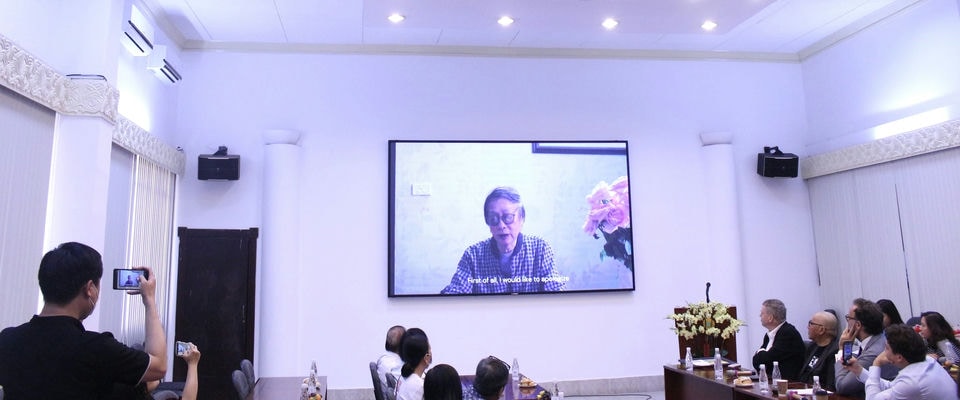HCMC – The Saigon Times Foundation on February 7 coordinated with the Vietnam National University-HCMC publisher to introduce the book “Nostalgia for the Countryside”, or Thương nhớ đồng quê in Vietnamese.
This is the first English book about film director Dang Nhat Minh, inspired by his notable works, and written by Dick Gebuys, a Dutch poet, writer and playwright. The author began writing the book in 2015 and completed it in 2019.
Braving cross-cultural, life differences
“Nostalgia for the Countryside” provides readers with information about the characteristics and life of film director Dang Nhat Minh, and other contemporary social issues.
The main contents of this book include a biography of Minh and a summary of his films, an analysis and a discussion about the director’s movies through their characters, meetings and talks with Minh, movie casts and several behind-the-scenes shots.
Sharing his difficulties in writing the book, Gebuys said there were two main issues. First, he needed to analyze various cultural data and reports. The book was initially very lengthy, so he had to cut several chapters but still retained its logical analysis.

The second hardship was the cross-cultural and life differences. Gebuys is a foreigner and found it hard to search for information about culture and society of Vietnam, including daily life, social class and wars.
“For issues relating to wars, a life during the prolonged wartime has a great historical meaning for many people, and perhaps I could not express it in its entirety,” said Gebuys.
Gebuys considers Minh a historian of special lives as his movies usually depicted history and the misery of individuals, giving an insight into each character’s inner world.
Describing the roles of the lives of Vietnamese women as his favorite part of the book, he said, “This is my favorite topic which is also the main theme of Minh’s movie about Vietnamese women. I tried my best and don’t think I could have improved my analysis.”

Highlighting Vietnamese cinema’s achievements
Sharing why he wrote about Minh, Gebuys said, “I was so impressed with his films. His movie, ‘Don’t burn’ was also the first Vietnamese movie I ever watched.”
The writer then expressed his interest to a friend who worked at the Vietnam Cinema Association, who offered to help him. After many talks with the director, he got to know the actors and actresses of Minh’s films and had discussions with them.”

“Some people asked me why I, coming from a different world, liked Vietnamese films. To be able to answer this question, I had to study a lot about director Minh,” said Gebuys.
According to the writer, the special features of Minh’s works included his insights into the inner world of the characters. While many other films depicted the outside world, the director’s movies exploited the inner world, describing emotions and highly personal sentiments. It is not an exaggeration to say that traditional values buried by modernization have survived through this director’s works.
Besides, his works boasted humanitarian characteristics, clearly depicting the cultural identity and Vietnamese people. This was evidenced by the character of an honest and kind-hearted farmer in the movie “Nostalgia for the Countryside” or the daily lives of Hanoi’s residents in “The guava season”.

Through the book “Nostalgia for the Countryside”, readers can discover different character images and the cultural identities of the Vietnamese, as analyzed and concluded by the writer of Minh’s many movies.
Though the director could not attend the presentation of the book “Nostalgia for the Countryside” due to health problems, Minh expressed his sincere gratitude to Gebuys.
Sharing his memories with the writer, the director said the first time he met the writer was during the screening day of the movie, “Don’t burn”, a story about a female doctor, Dang Thuy Tram. After that, Gebuys silently found all his movies and decided to write a book to introduce them to English readers.
When he found out, the director was very surprised. “My contribution to the cinema of Vietnam is so small compared to that of my colleagues. I hope that following this book, Gebuys will publish many books introducing the achievements of Vietnamese cinema through my older colleagues so that Vietnam’s cinema is known to many overseas readers, especially readers in Europe,” said Minh.
All the proceeds from book sales will go to the Saigon Times Foundation to cover monthly tuition fees for orphans at SOS Village Go Vap in HCMC and a kindergarten in Quang Thai, Thua Thien-Hue Province.
In addition, Tran Ngoc Chau, Public Relations Manager of the STF, former deputy-in-chief of the Saigon Times Group, bought 15 books to donate to two universities.
To buy a copy of the book, contact Room K11A, Buildings K, VNUHCM-University of Social Sciences and Humanities, 10-12 Dinh Tien Hoang, Ben Nghe Ward, District 1, HCMC.
Website: vnuhcmpress.edu.vn
Fanpage: https://www.facebook.com/nxbdhqghcm/
Tel: 028.66817058
Dick Gebuys is a Dutch writer and poet, who has been teaching literature at the Sintermeerten High School, Heerlen, the Netherlands, since 1979. He has participated in many projects involving literature, poetry and plays in Heerlen, Rotterdam, Dordrecht, Gent, Hasselt and Maastricht in HCMC and Hanoi. In 2015, he translated the book “Cocktail” written by Di Li into Dutch, which was known as the first book of a young Vietnamese writer to be translated into Dutch.
The Saigon Times Foundation (STF) is a non-profit organization, set up under a decision of the HCMC People’s Committee in 2002. Under the Saigon Times Group, the foundation has a mandate to serve the community and contribute to human resource development.









